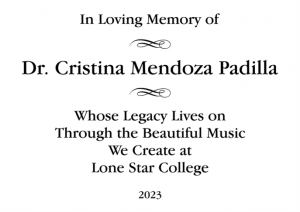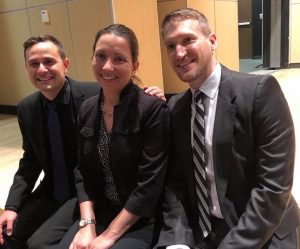
Issue No. 30 • April 2024
Crisis Management and Grief: Navigating the Unexpected Loss of a Beloved Music Professor
Facing the Unexpected
The work performed within the administrative realm of higher education is often filled with an overarching aim at intentionality and structure. From assessing student learning outcomes to accreditation compliance, higher education is purposeful in exacting its many standards and protocols. Mandatory training, institutional guidelines, and strict processes can keep a community college moving toward fulfilling its mission of serving students in their educational attainment. Yet, despite the best of intentions, there are some events and circumstances for which no training can sufficiently prepare a community college leader.
Early in the spring semester of 2023, the music department at Lone Star College-Montgomery experienced a tremendous loss when beloved full-time faculty member, Dr. Cristina Mendoza Padilla, died unexpectedly after a brief illness. Cristina was the Director of Bands and Lead Instrumental Faculty. She led the Jazz Ensemble, Symphonic Band, and instructed courses in Music Literature and American Music. The shock of her passing was a challenge for which I was unprepared, as it forced me to process the loss not only as her close friend, but also from the perspective as the Department Chair. Sanford (2018, p. 159) states “the impact of a faculty member death on colleagues, staff, and students can cause great distress and therefore requires careful attention and consideration for all.”
Dr. Cristina Mendoza Padilla
This essay shares lessons learned while navigating the unexpected death of a beloved faculty member. It is my wish that some of these ideas can serve as a road map should your college or department ever face a similar tragedy.
Cultural Context
LSC-Montgomery is a community college serving a suburban area on the north side of Greater Houston. It houses a thriving music department of about 50 music majors with around 100 students participating in its five ensembles. Three full-time music faculty and 24 adjunct faculty primarily teach applied lessons in the vocal and instrumental areas for the music department. LSC-Montgomery has the distinction of being designated an All-Steinway School, as well as a fully accredited member of the National Association of Schools of Music. As a community college, the faculty serve a diverse student population from a wide variety of backgrounds and musical experiences. For example, the Jazz Ensemble last spring boasted an age range of over 70 years between the youngest player (age 16) and the oldest (age 88). This span offers an exciting opportunity to foster shared collaboration across generations.
The performing arts provide a unique experience in higher education as music ensembles often bond with their conductor more closely than with their professors in other academic courses. Music has an innate ability to bring people together. Malloch and Trevarthen (2018) suggest “sensitive, respectful, playful, culturally informed teaching” in music education is what allows this bond to develop and strengthen (p. 1). Full-time music faculty also serve as academic advisors in the music department, so our music majors cultivate a strong connection with the three full-time faculty. The music department is a close-knit group, and we strive to ensure our students feel a strong sense of community and belonging.
Lessons Learned
Focus on the Students
After a faculty member’s death, leadership’s priority is to preserve the mental health of the students, faculty, and staff by providing the resources needed to alleviate the chronic effects of trauma. “Grieving students have reported difficulty concentrating and studying, leading to poorer grades, all of which could interfere with degree completion” (Hedman, 2012, p. 916). In the week following Cristina’s death, the Counseling Department generously made a counselor available in the lobby with whom students could meet. We posted signs throughout the building on the grieving process, and faculty checked in with students the remainder of the semester to ensure they were handling the bereavement process in a healthy manner.
Delegate
In the first hours and days of the crisis, one should leverage the ability to delegate tasks so no one person – even those in a leadership role – becomes overburdened with managing their own grief alongside the additional workload. Delegating tasks promotes the concept of shared governance that allows for a greater focus on collaboration (McKnight & Moore, 2022). Shared governance strengthens the bond of the team and permits the bulk of the workload to be more evenly distributed. I relied heavily upon my trusted colleagues, Dr. Mark Marotto, Director of Choirs; Christine Montag, Division Operations Manager; and Elaine Duke, Events Coordinator, for support in the hours after we received the terrible news. We worked as a team to divide crucial tasks and distribute the workload. While I began securing instructors to teach her courses and devised a game plan for moving forward, Dr. Marotto began working with the Lone Star College Foundation to establish an endowed scholarship in her honor. Christine Montag and Elaine Duke were crucial in organizing the celebration of life gathering we hosted for our campus five days following Cristina’s death.
Coordinate With the Family
Discuss with the family and other loved ones of the deceased faculty member their preferred method of communication to promote transparency and consistency in messaging with the students impacted by this loss. Create a point of contact and keep the family apprised of how the college is managing the situation. Inquire about funeral plans and next steps made by the family. This ensures clear communication and helps the family grasp the impact their loved one’s work has had on the lives of the students and the college. This also allows students to feel more connected to the family’s wishes and involved in the planning process. We used text messaging with Cristina’s husband and parents to ensure we were following their wishes and had their blessing with our plans to hold a celebration of life gathering and a memorial concert.
Lead With Empathy
It is important, especially during the first few hours and days of experiencing loss, to acknowledge the grief and sadness one may be experiencing. After my mother and sister died, I found comfort in going to work as it gave me something to focus on and helped channel my energy on something beyond my sorrow. However, after Cristina died, going to work was a painful reminder of the personal and professional loss I was going to have to accept. Fitzpatrick (2007) echoes this sentiment by exploring how, for some, the bereavement process may be stifled due to the demands of leading during a time of grief. The burden of work following the death of a beloved colleague may complicate the mourning process, much like I felt in the weeks following Cristina’s passing.
Holzweiss and Walker (2018) discuss the importance of self-care, which incorporates handling personal stress, finding occasions to reflect deeply on the trauma that has been a shared experience, and understanding how to lead while making decisions under pressure. Knowing how to lead with empathy for myself allowed me to guide the music department through this tragedy while still giving me space to feel and process the loss I was personally experiencing. This puts into practice Dr. Brené Brown’s (2018) recommendation in Dare to Lead that showing kindness to yourself is a powerful act of self-empathy.
Update the Learning Management System Integration
Require faculty to use a Learning Management System (LMS) such as D2L, Canvas, or Blackboard, for all attendance and grade records, even for in-person courses. Should a faculty member ever have an emergency, these records will prove invaluable and can allow whoever takes over the course to proceed knowing the attendance and grade book are accurate and up to date. Contact textbook publishers and the LMS vendor so the new instructor can be granted access to the course and instruction materials as soon as possible. Syllabi will need to be properly updated for compliance and should reflect the new instructor’s plan for the remainder of the course. It is recommended to honor the previous syllabus to support student success and allow for course consistency whenever possible despite the significant changes that have taken place.
Dr. Mendoza Padilla was a resourceful professor who was tech-savvy and very organized with her digital content. Were it not for the pristine organization within her syllabi and her detailed course schedules, I doubt we would have been able to establish a solid grasp of the most logical approach forward as quickly and efficiently as we did. It was thanks to her methodical online organization that I included this recommendation regarding the Learning Management System.
Use Digital Resources for Timely Communication
Use community groups in your LMS to distribute information quickly. This promotes equity since everyone, from faculty to students, receives the same information at the same time. If students download the free LMS application on their smartphones or tablets, they will receive a text notification in real time. This ensures clear communication and mitigates the risk of the “telephone game” effect from occurring that could create confusion or mixed messages.
Memorialize and Commemorate
In addition to the many logistical aspects of processing a sudden loss from an administrative perspective, it quickly became clear that the faculty should also consider how to provide an avenue through which the student population could channel their sense of loss and take some initial steps toward acceptance and closure. Many students expressed a strong desire to share their love and sympathy with Cristina’s family. In lieu of our Friday recital the week she died, we held a celebration of life service in the band hall to honor her remarkable contributions and career. We distributed sheets of paper (with a photo of her conducting) to allow students to write a cherished memory, story, or share their sentiments with the family. We collected over 100 messages and bound them to create a memorial book to offer the family. I asked a psychologist colleague (unaffiliated with the college) to read the papers to ensure all the messages were appropriate to give to the family, and we were able to offer this memorial book to her family a week later after the funeral. It was a beautiful way to document the profound effect she had on the lives of her students and colleagues at the college.
We decided to produce an end-of-semester memorial concert to honor Dr. Mendoza Padilla’s legacy. We prepared her favorite works for band and choir, and we invited alumni to participate in several selections. As stated previously, Dr. Marotto worked with the Lone Star College Foundation to establish the endowed Dr. Cristina Mendoza Padilla Memorial Scholarship. We knew this scholarship would honor Cristina’s legacy and provide a wonderful opportunity to financially assist future music students. The Memorial Concert was held in early May, just three months after her passing, and by that time the endowment had already received over $30,000 in donations. This was a remarkable achievement that shows how loved and respected Cristina was by the community. All the ticket proceeds raised were also contributed to the scholarship. A dozen members of her family were able to attend and witness this musical love letter to her. We recorded the event and provided the family the video as a keepsake.
Performing music following Cristina’s death was cathartic and provided the students a sense of purpose while upholding the connection they had with her. Hedman (2012) states that resilience occurs more frequently than believed, and the students shared with me how playing together helped them process their grief. Music is often regarded as a healing endeavor, and the ensembles gathering to make music that Cristina helped them learn and prepare was touching to behold, but most meaningful in how it allowed the students to process their shared loss.
In addition to the endowed memorial scholarship, we hung a plaque in honor of Dr. Cristina Mendoza Padilla in the band hall that current and future students will see as they enter and exit the space. The plaque outlines the impact of her contributions on our instrumental area and shares her career biography. It also mentions details about the endowed scholarship in her honor. We are hoping this memorial plaque will create a connection with current students who miss her and build a legacy connection with future students.
Find creative and meaningful ways for your institution to memorialize and commemorate a deceased faculty member. Establishing a memorial scholarship or hanging a physical display like a plaque are concrete examples of how a beloved faculty member can be remembered in perpetuity. An additional way we honored Cristina was by donating a piano to a chamber music ensemble comprised of students from our campus and LSC-Tomball. Affixed to the piano is the following memorial tablet that can be seen during concerts held at the Creekside Center.
Conclusion
It is crucial for higher education administrators, faculty, and staff to handle unexpected crises in a way that serves students’ needs while appropriately addressing the situation at hand. Employing an adaptive leadership style allows those in charge to rise to the occasion. Channing et al. (2020) state that leaders must cultivate their ability to adapt by demonstrating resourcefulness, composure, perseverance, and determination when faced with adversity. When leaders create an adaptive and empathetic space, students can learn how to process their emotions while still pursuing their academic goals and coursework. Leaders need to model to the students the path forward with grit and courage. It is my hope that how we managed this crisis at LSC-Montgomery can foster conversations in your college administrations as you establish your own protocols for how to handle similar experiences should the need arise.
Dr. Mark Marotto, Dr. Cristina Mendoza Padilla, and Michael Walsh
Michael Walsh, Department Chair, Music and Dance, and Associate Professor, Music, Lone Star College-Montgomery; and Doctoral Student, Ferris State University Community College Leadership Program, Michael.E.Walsh2@lonestar.edu
References
Brown, B. (2018). Dare to lead: Brave work, tough conversations, whole hearts. Random House.
Channing, J., Scott, P., & Abney, A. (2020). So, what do we do now?: Adaptive leadership capacity for community college leaders. Leadership Abstracts, 33(12).
Fitzpatrick, T.R. (2007). Bereavement among faculty members in a university setting. Social Work in Health Care, 45(4), 83-109. https://doi.org/10.1300/J010v45n04_05
Hedman, A.S. (2012). Faculty’s empathy and academic support for grieving students. Death Studies, 36(10), 914–931. https://doi.org/10.1080/07481187.2011.605986
Holzweiss, P., & Walker, D. (2018). Higher education crises: Training new professionals for crisis management. College Student Affairs Journal, 36(1), 124-135. https://doi.org/10.1353/csj.2018.0008
Malloch, S., & Trevarthen, C. (2018). The human nature of music. Frontiers in Psychology, 9, 1680. https://doi.org/10.3389/fpsyg.2018.01680
McNight, H., & Moore, S. M. (2022). Nursing shared governance. In StatPearls [Internet]. StatPearls Publishing. https://www.ncbi.nlm.nih.gov/books/NBK549862/
Sanford, J.T. (2018). Leading during loss: Death of a beloved faculty member. Journal of Professional Nursing, 34(3), 159-160. https://doi.org/10.1016/j.profnurs.2017.08.004




